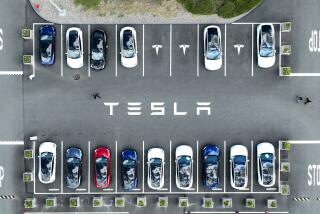Minority Auto Dealers Call for U.S. Assistance : Discrimination: Owners say economy and biased treatment have taken a severe toll. They want low-interest government loans, training programs and more access to foreign car sales.
- Share via
WASHINGTON — The auto sales recession is driving minority auto dealers out of business at twice the rate of other dealerships, and the predicament is even worse in Southern California, dealers said Friday.
Minority-owned auto dealerships want low-interest government loans, training programs and more access to foreign car sales, according to the National Assn. of Minority Automobile Dealers meeting here.
The organization’s chairman, Mel Farr, said at its semiannual meeting that government assistance is needed to help the 50% of minority dealerships that are operating at a loss and in danger of going out of business.
Since June, 1990, 142 dealers--or about 20% of all those owned by minorities--have gone under, said Farr, a onetime UCLA and Detroit Lion football star who owns several dealerships in the Detroit area.
Among all dealerships nationally, there were 904 fewer at the end of 1991 than there were a year earlier, the highest dealership casualty rate since 1982, according to Automotive News.
In Southern California, black dealer Bill Shack said the dominance of the car market by import companies--which the dealer group sharply criticized for failing to recruit minority dealers--makes survival even dicier.
Shack, whose Long Beach-based Shack Woods & Associates owns six Southern California dealerships after closing one and selling another to pay off debt, said minority dealers do not have the capital, experience or desirable franchises needed to weather a severe downturn.
“Add all those factors together and sprinkle in a depression, and it equals business failure,” said Shack, the nation’s largest minority auto dealer. “We need a longer fuse going to minority dealers so that the first breeze south doesn’t blow us away.
“California is in terrible shape,” he said. “Most of us who haven’t already gone out of business are in a loss position and are in critical need of cash.”
Farr said many minority dealers have had to put up their homes and other personal property as collateral to qualify for financial assistance from car manufacturers because capital from private sources isn’t available to them.
“Minority dealers tend to be offered and buy the worst franchises available, and usually pay the highest prices for them,” Farr said at a news conference. “Most are located in depressed areas and are single-line franchises, which limit the attraction of consumers.”
The group wants the government to reinstitute a 1980-81 program that made long-term, low-interest direct loans from the Small Business Administration available to minority auto dealers.
“Many dealers took advantage of that program, many of whom would not have survived without that assistance,” said Farr, who has three dealerships in Michigan and one in Ohio.
The group hopes for a $200-million loan program this time around.
The dealers are also seeking a $100-million Labor Department training program for minorities working in auto franchises. And they want manufacturers to target cities with large minority populations for future assembly plants and dealerships.
Those cities include Los Angeles, Detroit, Chicago, Atlanta, Dallas, Houston, Miami and Washington.
Shack said there are only about 20 minority owners of car and truck dealerships in Southern California, partly because minorities head a disproportionately small number of foreign dealerships. Cars built by foreign companies, mostly Japanese, account for more than half of all sales in California.
While minorities owned 584 of 18,871 domestic dealerships, they owned only 60 of 9,490 foreign dealerships, the minority dealer group reported.
It identified Toyota Motor Sales USA as the only foreign manufacturer with a minority dealer development program. All the foreign-owned auto firms have said they are trying to recruit minority dealers.
“The imports haven’t done a damn thing for us,” said Shack, whose dealerships are mainly Ford and Lincoln-Mercury outlets. He supported a recent call by former NAACP leader Benjamin Hooks for blacks to buy cars from the Big Three U.S. auto makers.
Paul Donnellan, director of congressional relations for the American International Automobile Dealers Assn., said the foreign dealers group would support government programs for minority dealers “as long as it’s not a government mandate on the industry.”
More to Read
Inside the business of entertainment
The Wide Shot brings you news, analysis and insights on everything from streaming wars to production — and what it all means for the future.
You may occasionally receive promotional content from the Los Angeles Times.










